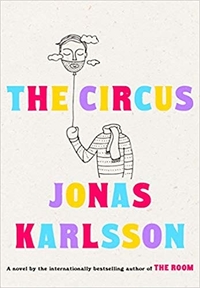The Circus by Jonas Karlsson
 Monday, January 27, 2020 at 6:02AM
Monday, January 27, 2020 at 6:02AM 
First published in Sweden in 2017; published in translation by Hogarth on January 28, 2020
The Circus lies somewhere on the border between surrealistic and realistic. It might best be categorized as a psychological mystery that challenges the reader to decide whether the evidence supplied by the narrator supports the conclusion he has drawn. The plot revolves around the disappearance of a man at a circus — he apparently entered a mirror, and like Alice, left this dimension and entered some secret realm. Or did he?
The narrator is invited to the circus by his friend, Magnus Gabrielsson. They haven’t spoken in a year and the narrator regards their meeting as a social obligation he needs to get out of the way. A circus magician announces that he will make a member of the audience disappear. Magnus volunteers. When the magician directs Magnus to walk behind the mirror, the narrator can see Magnus’ reflection in the mirror but cannot see Magnus. The act ends when the magician removes the mirror. The narrator expects to find Magnus at the intermission but Magnus cannot be found. Nor can he be found in the days that follow. Nor can rumors about his disappearance be confirmed.
We learn that the narrator was a friendless child until he met Magnus. The narrator spent his school hours listening to music on his Walkman (he was more fond of synth than hard rock). When he noticed Magnus hanging around the periphery of the school playground, he struck up a conversation about music. They bonded, although the narrator did most of the talking. Magnus absorbed the narrator’s music lectures, learning as much as possible about the bands Magnus recommended.
At some point, the narrator realizes “there was another life outside the claustrophobic little world Magnus and I constructed.” He imagines himself befriending a popular kid named Dennis until Dennis steals his Walkman. So much for the wider world.
As an adult, the narrator’s only friend is Jallo, who he met at a summer camp. When the narrator tells Jallo about Magnus’ disappearance, Jallo suggests an address the narrator should visit. The narrator is surprised when, after some false starts, he finally visits the correct address, but the surprise brings him no closer to solving the disappearance of Magnus.
Soon after Magnus disappears, the narrator begins to receive telephone calls from someone who never speaks. Is it Magnus? Or perhaps the ghost of Magnus? Music sometimes plays in the background, but is it music that Magnus would play? Sometimes the narrator plays music for the silent caller. Near the novel’s end, they carry on a conversation by playing songs to each other, a conversation that gets its content from the song titles.
All of this is strange but intriguing. Those attributes are the signature of a novel by Jonas Karlsson. Thanks to the narrator’s interaction with Jallo, the reader will come to suspect that the truth behind Magnus’ disappearance is quite different than the narrator believes it to be. Yet the ending suggests that even the explanation that Jallo proposes might not be true. Everything in a Karlsson novel is ambiguous because, well, isn’t life?
Reading a Karlsson novel is like taking a break from reality, or at least from the way we are accustomed to perceiving reality. Karlsson’s novels are always grounded in a philosophical view of existence. This one suggests that the world is a circus (or as Shakespeare suggested, a stage) and life is nothing but an attempt to impose order on chaos. Order is an artificial construct, one of our own devising, an unnatural state but perhaps a necessary one if we are to muddle through a life that only has the meaning we assign to it. Whether or not the reader accepts or rejects that philosophy, fiction that tells an absorbing story while inviting the reader to consider life from a different perspective is always worthwhile. And in the case of a Karlsson novel, it is always entertaining.
RECOMMENDED
Reader Comments